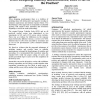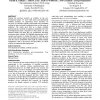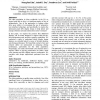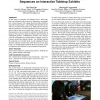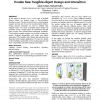108
click to vote
CHI
2011
ACM
14 years 6 months ago
2011
ACM
When designing questionnaires there is a tradition of including items with both positive and negative wording to minimize acquiescence and extreme response biases. Two disadvantag...
124
Voted
CHI
2011
ACM
14 years 6 months ago
2011
ACM
Despite the growing research on usability in the predevelopment phase, we know little about post-deployment usability activities. To characterize these activities, we surveyed 333...
125
Voted
CHI
2011
ACM
14 years 6 months ago
2011
ACM
The elder population is rising worldwide; in the US, no longer being able to drive is a significant marker of loss of independence. One of the approaches to helping elders drive m...
104
Voted
CHI
2011
ACM
14 years 6 months ago
2011
ACM
People with chronic health problems use online resources to understand and manage their condition, but many such resources can present competing and confusing viewpoints. We surve...
79
Voted
CHI
2011
ACM
14 years 6 months ago
2011
ACM
This paper investigates the philosophical question of how we can experience energy with the aim of informing the design of future ways of experiencing energy by means of technolog...
111
Voted
CHI
2011
ACM
14 years 6 months ago
2011
ACM
Exertion games require investing physical effort. The fact that such games can support physical health is tempered by our limited understanding of how to design for engaging exert...
135
Voted
CHI
2011
ACM
14 years 6 months ago
2011
ACM
Finding relevant information within the vast amount of information exchanged via feeds is difficult. Previous research into this problem has largely focused on recommending relev...
154
Voted
CHI
2011
ACM
14 years 6 months ago
2011
ACM
Patients’ basic understanding of clinical events has been shown to dramatically improve patient care. We propose that the automatic generation of very short microexplanations, s...
122
Voted
CHI
2011
ACM
14 years 6 months ago
2011
ACM
In this paper we describe our findings from a field study that was conducted at the Vancouver Aquarium to investigate how visitors interact with a large interactive table exhibi...
99
Voted
CHI
2011
ACM
14 years 6 months ago
2011
ACM
In this paper we present Geckos, a new type of tangible objects which are tracked using a Force-Sensitive Resistance sensor. Geckos are based on low-cost permanent magnets and can...
